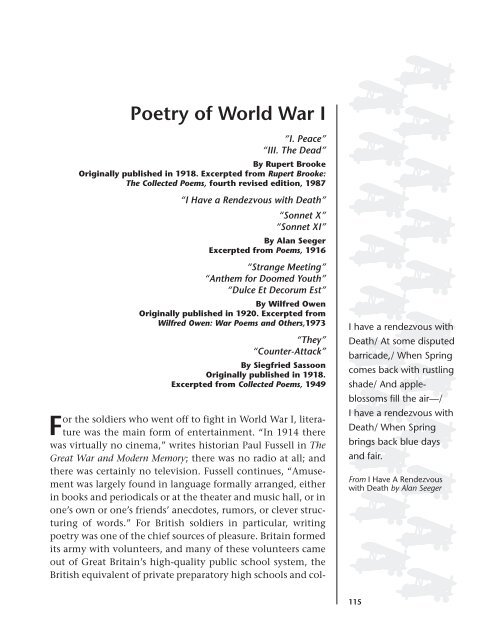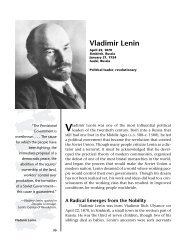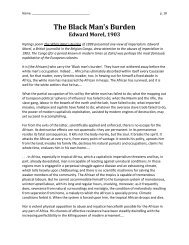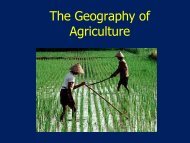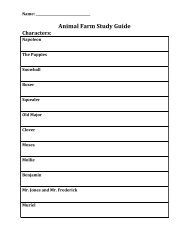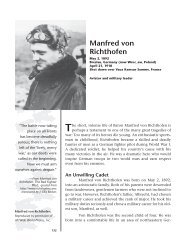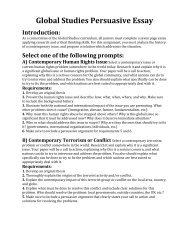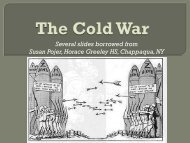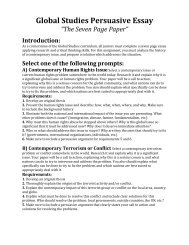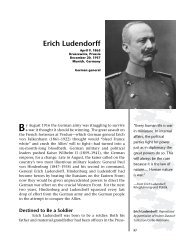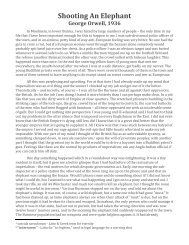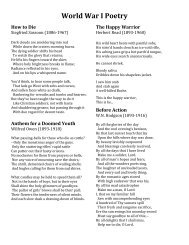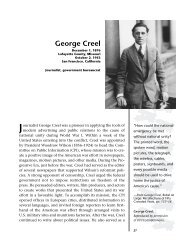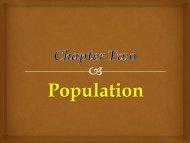Poetry of World War I
Poetry of World War I
Poetry of World War I
You also want an ePaper? Increase the reach of your titles
YUMPU automatically turns print PDFs into web optimized ePapers that Google loves.
<strong>Poetry</strong> <strong>of</strong> <strong>World</strong> <strong>War</strong> I<br />
“I. Peace”<br />
“III. The Dead”<br />
By Rupert Brooke<br />
Originally published in 1918. Excerpted from Rupert Brooke:<br />
The Collected Poems, fourth revised edition, 1987<br />
“I Have a Rendezvous with Death”<br />
“Sonnet X”<br />
“Sonnet XI”<br />
By Alan Seeger<br />
Excerpted from Poems, 1916<br />
“Strange Meeting”<br />
“Anthem for Doomed Youth”<br />
“Dulce Et Decorum Est”<br />
By Wilfred Owen<br />
Originally published in 1920. Excerpted from<br />
Wilfred Owen: <strong>War</strong> Poems and Others,1973<br />
“They”<br />
“Counter-Attack”<br />
By Siegfried Sassoon<br />
Originally published in 1918.<br />
Excerpted from Collected Poems, 1949<br />
For the soldiers who went <strong>of</strong>f to fight in <strong>World</strong> <strong>War</strong> I, literature<br />
was the main form <strong>of</strong> entertainment. “In 1914 there<br />
was virtually no cinema,” writes historian Paul Fussell in The<br />
Great <strong>War</strong> and Modern Memory; there was no radio at all; and<br />
there was certainly no television. Fussell continues, “Amusement<br />
was largely found in language formally arranged, either<br />
in books and periodicals or at the theater and music hall, or in<br />
one’s own or one’s friends’ anecdotes, rumors, or clever structuring<br />
<strong>of</strong> words.” For British soldiers in particular, writing<br />
poetry was one <strong>of</strong> the chief sources <strong>of</strong> pleasure. Britain formed<br />
its army with volunteers, and many <strong>of</strong> these volunteers came<br />
out <strong>of</strong> Great Britain’s high-quality public school system, the<br />
British equivalent <strong>of</strong> private preparatory high schools and col-<br />
I have a rendezvous with<br />
Death/ At some disputed<br />
barricade,/ When Spring<br />
comes back with rustling<br />
shade/ And appleblossoms<br />
fill the air—/<br />
I have a rendezvous with<br />
Death/ When Spring<br />
brings back blue days<br />
and fair.<br />
From I Have A Rendezvous<br />
with Death by Alan Seeger<br />
115
Rupert Brooke (1887–1915)<br />
English poet Rupert Brooke is<br />
perhaps the most famous <strong>of</strong> the patriotic<br />
poets, poets who celebrated England’s<br />
entry into <strong>World</strong> <strong>War</strong> I. Born on August 3,<br />
1887, to a family <strong>of</strong> educators, Brooke<br />
excelled at school. He became part <strong>of</strong> a<br />
circle <strong>of</strong> poets at Cambridge University<br />
who rebelled against the poetry <strong>of</strong> their<br />
parents’ generation and hoped to create<br />
new verses that were realistic, bold, and<br />
vital. They were known as the Georgian<br />
poets. Brooke published his first collection<br />
<strong>of</strong> poems in 1911 and made his name by<br />
contributing to Georgian <strong>Poetry</strong>, a book<br />
containing selected works by different<br />
poets, published in 1912.<br />
Like many other educated young<br />
Englishmen, Brooke responded to the<br />
declaration <strong>of</strong> war in 1914 with patriotic<br />
fervor. He had tired <strong>of</strong> “a world grown old<br />
and cold and weary” and hoped to find<br />
glory in the war. His sonnets (fourteen-line<br />
poems) about the thrill <strong>of</strong> going <strong>of</strong>f to war<br />
to fight for his country were published and<br />
British poet Rupert Brooke.<br />
(Corbis Corporation. Reproduced by permission.)<br />
became wildly popular in England. Brooke<br />
never saw action in the war; he was on his<br />
way to fight the Turks at Gallipoli when he<br />
contracted blood poisoning from an insect<br />
bite on his lip. He died on the island <strong>of</strong><br />
Scyros in the Aegean Sea on April 23, 1915.<br />
leges in the United States. Many British soldiers were therefore<br />
well-educated men who appreciated poetry.<br />
British soldiers had a special relationship with literature.<br />
British schooling was based on the idea that understanding the<br />
poetry <strong>of</strong> the past makes people good citizens. Thus, all British<br />
students were familiar with a wide range <strong>of</strong> poets, from ancient<br />
Greek poets to those more recent, such as British writer Thomas<br />
Hardy. Many soldiers carried with them to the front a standard<br />
volume called the Oxford Book <strong>of</strong> English Verse, a collection <strong>of</strong><br />
116 <strong>World</strong> <strong>War</strong> I: Primary Sources
important poetry; others had recent<br />
publications <strong>of</strong> poetry sent to them.<br />
Such books were extremely popular at<br />
the front, for they provided a diversion<br />
from the horror and tedium <strong>of</strong> war.<br />
Fussell quotes the story <strong>of</strong> Herbert Read,<br />
who was mailed a copy <strong>of</strong> a book <strong>of</strong><br />
verse by poet Robert Browning: “At first<br />
I was mocked in the dugout as a highbrow<br />
for reading The Ring and the Book,<br />
but saying nothing I waited until one <strong>of</strong><br />
the sc<strong>of</strong>fers idly picked it up. In ten minutes<br />
he was absorbed, and in three days<br />
we were fighting for turns to read it, and<br />
talking <strong>of</strong> nothing else at meals.”<br />
Schooled in poetry, many<br />
British soldiers turned to writing<br />
poetry to record their reactions to the<br />
war. And as it turned out, <strong>World</strong> <strong>War</strong> I<br />
produced more poetry than any war<br />
before or since. Hundreds <strong>of</strong> volumes<br />
<strong>of</strong> war poetry were published; according<br />
to John Lehmann, author <strong>of</strong> The<br />
English Poets <strong>of</strong> the First <strong>World</strong> <strong>War</strong>,<br />
“There was a period, during and<br />
directly after the <strong>War</strong>, when almost<br />
any young man who could express his<br />
thoughts and feelings in verse could<br />
find a publisher and a public.” Poets—<br />
including Rupert Brooke, Siegfried<br />
Sassoon, Wilfred Owen, Edmund<br />
Blunden, Alan Seeger (the rare American),<br />
Robert Graves, Isaac Rosenberg,<br />
and many others—recorded all the<br />
various ways that soldiers experienced<br />
the war, from the first longings for<br />
glory to the final sickening confrontation<br />
with death. Many <strong>of</strong> these poems<br />
are now forgotten, but many others—<br />
such as the ones included below—are<br />
still remembered and taught. These poems provide a fascinating<br />
view <strong>of</strong> the first modern war.<br />
Alan Seeger (1888–1916)<br />
The only major American war<br />
poet, Alan Seeger was born in New York<br />
City in 1888. Seeger attended Harvard<br />
College, where he dabbled in poetry and<br />
began to develop a reputation as a<br />
freethinker (someone who does not<br />
follow the conventions <strong>of</strong> his peers). After<br />
graduation he returned to New York City,<br />
but he grew to dislike life in America; he<br />
felt that Americans were uncivilized and<br />
incapable <strong>of</strong> enjoying life’s true pleasures,<br />
such as fine wine, good food, and art. In<br />
1912 Seeger moved to Paris, France.<br />
When <strong>World</strong> <strong>War</strong> I began, Seeger<br />
leaped at the chance to enlist in the<br />
French Foreign Legion, a division <strong>of</strong> the<br />
French army that accepted enlistments<br />
from foreigners. Seeger hoped to find in<br />
war the intensity and excitement that he<br />
craved. Seeger served in the foreign<br />
legion for nearly two years, seeing action<br />
in battles at Aisne and Champagne, but<br />
he was bored whenever he was out <strong>of</strong><br />
battle. He soothed his boredom in part<br />
by writing poems; his only collection <strong>of</strong><br />
poetry was published in 1916. On July 4,<br />
1916, Seeger took part in one <strong>of</strong> the<br />
major battles <strong>of</strong> the war, the Battle <strong>of</strong> the<br />
Somme. Pushing forward on the first day<br />
<strong>of</strong> the attack, he was gunned down by<br />
German machine-gun fire, crawled into a<br />
shell hole, and died.<br />
Literature <strong>of</strong> the Great <strong>War</strong>: <strong>Poetry</strong> <strong>of</strong> <strong>World</strong> <strong>War</strong> I 117
The poetry <strong>of</strong> <strong>World</strong> <strong>War</strong> I closely reflects the attitudes<br />
that many soldiers had toward the war. The first poems—<br />
including those by Brooke and Seeger—brim with the confidence<br />
<strong>of</strong> soldiers who believe that they are embarking on a glorious<br />
adventure. For the first year or two <strong>of</strong> the war, many<br />
poems spoke <strong>of</strong> honor, glory, and patriotism; they compared<br />
the duties <strong>of</strong> modern soldiers with those <strong>of</strong> warriors celebrated<br />
in the epic poems <strong>of</strong> the ancient Greeks. Yet the slowly dawning<br />
horror <strong>of</strong> the continuing war began to reshape war poetry,<br />
just as it reshaped the attitudes <strong>of</strong> everyone involved in the war.<br />
As the war wore on, poets such as Wilfred Owen and Siegfried<br />
Sassoon began to write bitter, cutting verses about the horror <strong>of</strong><br />
war and the failure <strong>of</strong> patriotic visions. After 1916, writes<br />
Lehmann, “the dreams were shattered, and patriotism became<br />
a matter <strong>of</strong> grim endurance against all odds, <strong>of</strong> despairing hope<br />
almost buried beneath the huge weight <strong>of</strong> disillusionment, <strong>of</strong><br />
the need not to be defeated existing beside the belief that it was<br />
increasingly not merely stupid but almost criminal not to negotiate<br />
an end to the slaughter.”<br />
Things to remember while reading the<br />
poems <strong>of</strong> hope and glory by Rupert Brooke<br />
and Alan Seeger:<br />
• The poems by Rupert Brooke and Alan Seeger hint at the<br />
attitudes poets had toward the war during the first period<br />
<strong>of</strong> war poetry, the period <strong>of</strong> hope and honor and glory. In<br />
these poems the poets speak <strong>of</strong> leaving the petty pleasures<br />
<strong>of</strong> civilian life for the exalted life <strong>of</strong> a soldier; they are<br />
romantic and hopeful.<br />
• Literature and warfare went hand in hand during <strong>World</strong><br />
<strong>War</strong> I. Many <strong>of</strong> the war poets composed their poems while<br />
sitting in the trenches waiting for a battle to begin; novelists<br />
and essayists also composed their works under the<br />
most difficult conditions. Reading was a common way <strong>of</strong><br />
passing long hours between battles.<br />
• <strong>Poetry</strong> can be difficult. Poets use uncommon and sometimes<br />
old-fashioned words to convey their ideas; they<br />
<strong>of</strong>ten refer to ancient myths or to other poems that most<br />
people today do not know. Poets condense meaning into<br />
tight knots <strong>of</strong> words, and it can be difficult to untie those<br />
118 <strong>World</strong> <strong>War</strong> I: Primary Sources
knots. But the very things that make poetry difficult also<br />
make it rewarding. It may help to read the poems several<br />
times or to read them aloud. Think <strong>of</strong> a poem as a puzzle<br />
and see if you can solve it.<br />
“I. Peace”<br />
By Rupert Brooke<br />
Now, God be thanked Who has matched us with His<br />
hour,<br />
And caught our youth, and wakened us from<br />
sleeping,<br />
With hand made sure, clear eye, and sharpened power,<br />
To turn, as swimmers into cleanness leaping,<br />
Glad from a world grown old and cold and weary,<br />
Leave the sick hearts that honour could not move,<br />
And half-men, and their dirty songs and dreary,<br />
And all the little emptiness <strong>of</strong> love!<br />
Oh! we, who have known shame, we have found<br />
release there,<br />
Where there’s no ill, no grief, but sleep has mending,<br />
Naught broken save this body, lost but breath;<br />
Nothing to shake the laughing heart’s long peace there<br />
But only agony, and that has ending;<br />
And the worst friend and enemy is but Death.<br />
“III. The Dead”<br />
By Rupert Brooke<br />
Blow out, you bugles, over the rich Dead!<br />
There’s none <strong>of</strong> these so lonely and poor <strong>of</strong> old,<br />
But, dying, has made us rarer gifts than gold.<br />
These laid the world away; poured out the red<br />
Sweet wine <strong>of</strong> youth; gave up the years to be<br />
Of work and joy, and that unhoped serene,<br />
That men call age; and those who would have been,<br />
Their sons, they gave, their immortality.<br />
Who has matched us with<br />
His hour: Who has allowed us<br />
to be here at this important<br />
moment in history.<br />
Naught: Nothing.<br />
Save: Except.<br />
Literature <strong>of</strong> the Great <strong>War</strong>: <strong>Poetry</strong> <strong>of</strong> <strong>World</strong> <strong>War</strong> I 119
Blow, bugles, blow! They brought us, for our dearth,<br />
Holiness, lacked so long, and Love, and Pain.<br />
Honour has come back, as a king, to earth,<br />
And paid his subjects with a royal wage;<br />
And nobleness walks in our ways again;<br />
And we have come into our heritage.<br />
“I Have a Rendezvous with Death”<br />
By Alan Seeger<br />
Dearth: Shortage <strong>of</strong>, lack.<br />
Rendezvous: A<br />
prearranged meeting.<br />
Nigh: Near.<br />
Baffling all pursuit:<br />
Always out <strong>of</strong> reach.<br />
I have a rendezvous with Death<br />
At some disputed barricade,<br />
When Spring comes back with rustling shade<br />
And apple-blossoms fill the air—<br />
I have a rendezvous with Death<br />
When Spring brings back blue days and fair.<br />
It may be he shall take my hand<br />
And lead me into his dark land<br />
And close my eyes and quench my breath—<br />
It may be I shall pass him still.<br />
I have a rendezvous with Death<br />
On some scarred slope <strong>of</strong> battered hill,<br />
When Spring comes round again this year<br />
And the first meadow-flowers appear.<br />
God knows ‘twere better to be deep<br />
Pillowed in silk and scented down,<br />
Where Love throbs out in blissful sleep,<br />
Pulse nigh to pulse, and breath to breath<br />
Where hushed awakenings are dear. . .<br />
But I’ve a rendezvous with Death<br />
At midnight in some flaming town,<br />
When Spring trips north again this year,<br />
And I to my pledged word am true,<br />
I shall not fail that rendezvous.<br />
“Sonnet X”<br />
By Alan Seeger<br />
I have sought Happiness, but it has been<br />
A lovely rainbow, baffling all pursuit,<br />
120 <strong>World</strong> <strong>War</strong> I: Primary Sources
And tasted Pleasure, but it was a fruit<br />
More fair <strong>of</strong> outward hue than sweet within.<br />
Renouncing both, a flake in the ferment<br />
Of battling hosts that conquer or recoil,<br />
There only, chastened by fatigue and toil,<br />
I knew what came the nearest to content.<br />
For there at least my troubled flesh was free<br />
From the gadfly Desire that plagued it so;<br />
Discord and Strife were what I used to know,<br />
Heartaches, deception, murderous jealousy;<br />
By <strong>War</strong> transported far from all <strong>of</strong> these,<br />
Amid the clash <strong>of</strong> arms I was at peace.<br />
“Sonnet XI: On Returning to the<br />
Front After Leave”<br />
By Alan Seeger<br />
Apart sweet women (for whom Heaven be blessed),<br />
Comrades, you cannot think how thin and blue<br />
Look the leftovers <strong>of</strong> mankind that rest,<br />
Now that the cream has been skimmed <strong>of</strong>f in you.<br />
<strong>War</strong> has its horrors, but has this <strong>of</strong> good—<br />
That its sure processes sort out and bind<br />
Brave hearts in one intrepid brotherhood<br />
And leave the shams and imbeciles behind.<br />
Now turn we joyful to the great attacks,<br />
Not only that we face in a fair field<br />
Our valiant foe and all his deadly tools,<br />
But also that we turn disdainful backs<br />
On that poor world we scorn yet die to shield—<br />
That world <strong>of</strong> cowards, hypocrites, and fools.<br />
A flake in the ferment / Of<br />
battling hosts that conquer<br />
or recoil: As an individual<br />
soldier caught in a clash<br />
between great nations, the<br />
poet is comparing himself to a<br />
flake—perhaps <strong>of</strong> snow—<br />
caught in a ferment, or storm.<br />
Chastened: Subdued or<br />
worn out.<br />
Apart: Apart from; other than.<br />
Things to remember while reading the poems<br />
<strong>of</strong> disillusionment by Wilfred Owen and<br />
Siegfried Sassoon:<br />
• The following five poems by Wilfred Owen and Siegfried<br />
Sassoon take a very different view <strong>of</strong> war. These are poems<br />
Literature <strong>of</strong> the Great <strong>War</strong>: <strong>Poetry</strong> <strong>of</strong> <strong>World</strong> <strong>War</strong> I 121
<strong>of</strong> harsh disillusionment. The<br />
authors seem to realize that there<br />
is no higher calling to war but<br />
merely a bitter struggle to survive.<br />
• Though the romantic and optimistic<br />
poems <strong>of</strong> Alan Seeger and<br />
Rupert Brooke were very popular<br />
early in the war, the work <strong>of</strong> Owen<br />
and Sassoon was much more popular<br />
late in the war and afterwards.<br />
The change reflected in these<br />
poems is said to mark the emergence<br />
<strong>of</strong> modern literature, which<br />
focuses more on the perceptions <strong>of</strong><br />
common people than earlier literature<br />
does.<br />
Wilfred Owen.<br />
(The Granger Collection.<br />
Reproduced by permission.)<br />
Groined: Opened holes in.<br />
That vision’s face was<br />
grained: The man’s face<br />
was etched with pain.<br />
Flues: Chimneys <strong>of</strong><br />
the tunnel.<br />
“Strange Meeting”<br />
By Wilfred Owen<br />
It seemed that out <strong>of</strong> battle I escaped<br />
Down some pr<strong>of</strong>ound dull tunnel, long since scooped<br />
Through granites which titanic wars had groined.<br />
Yet also there encumbered sleepers groaned,<br />
Too fast in thought or death to be bestirred.<br />
Then, as I probed them, one sprang up, and stared<br />
With piteous recognition in fixed eyes,<br />
Lifting distressful hands, as if to bless.<br />
And by his smile, I knew that sullen hall,—<br />
By his dead smile I knew we stood in Hell.<br />
With a thousand pains that vision’s face was grained;<br />
Yet no blood reached there from the upper ground,<br />
And no guns thumped, or down the flues made moan.<br />
‘Strange friend,’ I said, ‘here is no cause to mourn.’<br />
‘None,’ said that other, ‘save the undone years,<br />
The hopelessness. Whatever hope is yours,<br />
122 <strong>World</strong> <strong>War</strong> I: Primary Sources
Wilfred Owen (1893–1918)<br />
Unlike poets Alan Seeger and<br />
Rupert Brooke, Wilfred Owen wrote not <strong>of</strong><br />
the glory <strong>of</strong> war but <strong>of</strong> the pity <strong>of</strong> war.<br />
Owen was born in Oswestry, England, on<br />
March 18, 1893, to a humble, religious<br />
family. Owen excelled at school and<br />
eventually attended the University <strong>of</strong><br />
London, but he was forced to leave the<br />
university when he ran short <strong>of</strong> money. He<br />
worked for a time as a reverend’s assistant<br />
and as a schoolteacher, but he had not yet<br />
found his calling when he decided to enroll<br />
in the English army in the summer <strong>of</strong> 1915.<br />
Owen served as an <strong>of</strong>ficer in the<br />
Second Battalion Manchester Regiment,<br />
and he saw plenty <strong>of</strong> action. Leading a<br />
regiment in a battle at Serre, he saw many<br />
<strong>of</strong> his men killed and wounded. These<br />
memories <strong>of</strong> battle would soon fuel an<br />
outpouring <strong>of</strong> poetry. In 1917 Owen was<br />
hospitalized with a concussion and shell<br />
shock (a term indicating that a soldier was<br />
so mentally distraught from fighting that<br />
he could no longer serve). At the<br />
Craiglockhart <strong>War</strong> Hospital in Edinburgh,<br />
Scotland, Owen met poet Siegfried<br />
Sassoon. The two poets spurred each other<br />
on, and both created some <strong>of</strong> their<br />
greatest works while at the hospital.<br />
Owen returned to active duty in<br />
September 1918 and was soon sent to<br />
attack some <strong>of</strong> the Germans’ strongest<br />
defensive positions on the Hindenburg line<br />
(a line <strong>of</strong> concrete-reinforced trenches built<br />
by the Germans). Owen earned a Military<br />
Cross (war medal) for his efforts, but he was<br />
soon killed in a battle on November 4,<br />
1918, one week before the end <strong>of</strong> the war.<br />
Owen’s friends and admirers—including<br />
Sassoon—made sure that Owen’s poetry<br />
was published, and Owen is now considered<br />
one <strong>of</strong> the greatest <strong>of</strong> the war poets.<br />
Was my life also; I went hunting wild<br />
After the wildest beauty in the world,<br />
Which lies not calm in eyes, or braided hair,<br />
But mocks the steady running <strong>of</strong> the hour,<br />
And if it grieves, grieves richlier than here.<br />
For by my glee might many men have laughed,<br />
And <strong>of</strong> my weeping something had been left,<br />
Which must die now. I mean the truth untold,<br />
The pity <strong>of</strong> war, the pity war distilled.<br />
Now men will go content with what we spoiled,<br />
Or, discontent, boil bloody, and be spilled.<br />
They will be swift with swiftness <strong>of</strong> the tigress.<br />
Literature <strong>of</strong> the Great <strong>War</strong>: <strong>Poetry</strong> <strong>of</strong> <strong>World</strong> <strong>War</strong> I 123
None will break ranks, though nations trek from progress.<br />
Courage was mine, and I had mystery,<br />
Wisdom was mine, and I had mastery:<br />
To miss the march <strong>of</strong> this retreating world<br />
Into vain citadels that are not walled.<br />
Then, when much blood had clogged their chariot-wheels,<br />
I would go up and wash them from sweet wells,<br />
Even with truths that lie too deep for taint.<br />
I would have poured my spirit without stint<br />
But not through wounds; not on the cess <strong>of</strong> war.<br />
Foreheads <strong>of</strong> men have bled where no wounds were.<br />
I am the enemy you killed, my friend.<br />
I knew you in this dark: for so you frowned<br />
Yesterday through me as you jabbed and killed.<br />
I parried; but my hands were loath and cold.<br />
Let us sleep now. . . .’<br />
“They”<br />
By Siegfried Sassoon<br />
The Bishop tells us: ‘When the boys come back<br />
They will not be the same; for they’ll have fought<br />
In a just cause: they lead the last attack<br />
On Anti-Christ; their comrades’ blood has bought<br />
New right to breed an honourable race,<br />
They have challenged Death and dared him face to face.’<br />
Citadels: Fortresses.<br />
Taint: Any trace <strong>of</strong> discredit<br />
or dishonor.<br />
‘We’re none <strong>of</strong> us the same!’ the boys reply.<br />
‘For George lost both his legs; and Bill’s stone blind;<br />
Poor Jim’s shot through the lungs and like to die;<br />
And Bert’s gone syphilitic: you’ll not find<br />
A chap who’s served that hasn’t found some change.’<br />
And the Bishop said: ‘The ways <strong>of</strong> God are strange!’<br />
Without stint: Without limit.<br />
Cess: Cessation, or end.<br />
Gone syphilitic: Caught a<br />
venereal disease.<br />
Passing-bells: Bells rung to<br />
announce a death.<br />
“Anthem for Doomed Youth”<br />
By Wilfred Owen<br />
What passing-bells for these who die as cattle<br />
—Only the monstrous anger <strong>of</strong> the guns.<br />
124 <strong>World</strong> <strong>War</strong> I: Primary Sources
Only the stuttering rifles’ rapid rattle<br />
Can patter out their hasty orisons.<br />
No mockeries now for them; no prayers nor bells;<br />
Nor any voice <strong>of</strong> mourning save the choirs, —<br />
The shrill, demented choirs <strong>of</strong> wailing shells;<br />
And bugles calling for them from sad shires.<br />
What candles may be held to speed them all<br />
Not in the hands <strong>of</strong> boys but in their eyes<br />
Shall shine the holy glimmers <strong>of</strong> goodbyes.<br />
The pallor <strong>of</strong> girls’ brows shall be their pall;<br />
Their flowers the tenderness <strong>of</strong> patient minds,<br />
And each slow dusk a drawing-down <strong>of</strong> blinds.<br />
“Counter-Attack”<br />
By Siegfried Sassoon<br />
We’d gained our first objective hours before<br />
While dawn broke like a face with blinking eyes,<br />
Pallid, unshaved and thirsty, blind with smoke.<br />
Things seemed all right at first. We held their line,<br />
With bombers posted, Lewis guns well placed,<br />
And clink <strong>of</strong> shovels deepening the shallow trench.<br />
The place was rotten with dead; green clumsy legs<br />
High-booted, sprawled and grovelled along the saps;<br />
And trunks, face downward in the sucking mud,<br />
Wallowed like trodden sand-bags loosely filled;<br />
And naked sodden buttocks, mats <strong>of</strong> hair,<br />
Bulged, clotted heads, slept in the plastering slime.<br />
And then the rain began—the jolly old rain!<br />
A yawning soldier knelt against the bank,<br />
Staring across the morning blear with fog;<br />
He wondered when the Allemands would get busy;<br />
And then, <strong>of</strong> course, they started with five-nines<br />
Traversing, sure as fate, and never a dud.<br />
Mute in the clamour <strong>of</strong> shells he watched them burst<br />
Spouting dark earth and wire with gusts from hell,<br />
While posturing giants dissolved in drifts <strong>of</strong> smoke.<br />
He crouched and flinched, dizzy with galloping fear,<br />
Sick for escape—loathing the strangled horror<br />
And butchered, frantic gestures <strong>of</strong> the dead.<br />
Patter out their hasty<br />
orisons: Speak their funeral<br />
prayers.<br />
Shires: English country<br />
villages.<br />
Pallor: Paleness.<br />
Pall: C<strong>of</strong>fin.<br />
Pallid: Lacking color or<br />
liveliness.<br />
Posted: In position.<br />
Grovelled: Crawled.<br />
Saps: Covered trenches.<br />
Blear: Blurred, dimmed.<br />
Allemands: Germans.<br />
Five-nines: Explosive shells.<br />
Posturing giants: The poet is<br />
probably referring to the<br />
towers <strong>of</strong> smoke and dust that<br />
rise from shell blasts and are<br />
blown apart by the wind.<br />
Literature <strong>of</strong> the Great <strong>War</strong>: <strong>Poetry</strong> <strong>of</strong> <strong>World</strong> <strong>War</strong> I 125
An <strong>of</strong>ficer came blundering down the trench:<br />
‘Stand-to and man the fire-step!’ On he went. . .<br />
Gasping and bawling, ‘Fire-step . . . counter-attack!’<br />
Then the haze lifted. Bombing on the right<br />
Down the old sap: machine-guns on the left;<br />
And stumbling figures looming out in front.<br />
‘O Christ, they’re coming at us!’ Bullets spat,<br />
And he remembered his rifle . . . rapid fire . . .<br />
And started blazing wildly . . . then a bang<br />
Crumpled and spun him sideways, knocked him out<br />
To grunt and wriggle: none heeded him; he choked<br />
And fought the flapping veils <strong>of</strong> smothering gloom,<br />
Lost in a blurred confusion <strong>of</strong> yells and groans. . .<br />
Down, and down, and down, he sank and drowned,<br />
Bleeding to death. The counter-attack had failed.<br />
Fire-step: The top step <strong>of</strong><br />
a trench.<br />
Knock-kneed: Literally, an<br />
inward curvature <strong>of</strong> the legs,<br />
but here the poet is referring<br />
to legs bowed by the weight<br />
<strong>of</strong> a load.<br />
We turned our backs:<br />
Retreated.<br />
Blood-shod: Wearing blood<br />
for shoes; soldiers <strong>of</strong>ten lost<br />
their boots and were forced<br />
to march barefoot, cutting<br />
their feet.<br />
Five-Nines: Explosive shells.<br />
Clumsy helmets: Gas masks.<br />
Misty panes and thick green<br />
light: The poet is referring to<br />
the experience <strong>of</strong> looking<br />
through the thick, foggy<br />
lenses <strong>of</strong> gas masks into the<br />
green fog <strong>of</strong> poison gas.<br />
Guttering: In a sorry or<br />
degraded state.<br />
“Dulce Et Decorum Est”<br />
By Wilfred Owen<br />
Bent double, like old beggars under sacks,<br />
Knock-kneed, coughing like hags, we cursed through<br />
sludge,<br />
Till on the haunting flares we turned our backs<br />
And towards our distant rest began to trudge.<br />
Men marched asleep. Many had lost their boots<br />
But limped on, blood-shod. All went lame, all blind;<br />
Drunk with fatigue; deaf even to the hoots<br />
Of tired, outstripped Five-Nines that dropped behind.<br />
Gas! GAS! Quick, boys!—An ecstasy <strong>of</strong> fumbling,<br />
Fitting the clumsy helmets just in time;<br />
But someone still was yelling out and stumbling,<br />
And flound’ring like a man in fire or lime. . . .<br />
Dim, through the misty panes and thick green light,<br />
As under a green sea, I saw him drowning.<br />
In all my dreams, before my helpless sight,<br />
He plunges at me, guttering, choking, drowning.<br />
If in some smothering dreams you too could pace<br />
Behind the wagon that we flung him in,<br />
And watch the white eyes writhing in his face,<br />
126 <strong>World</strong> <strong>War</strong> I: Primary Sources
British troops blinded by mustard gas in a German gas attack at Bethune, France, April 1918.<br />
(Archive Photos. Reproduced by permission.)<br />
Literature <strong>of</strong> the Great <strong>War</strong>: <strong>Poetry</strong> <strong>of</strong> <strong>World</strong> <strong>War</strong> I 127
Froth-corrupted lungs:<br />
Poison gas caused the lungs<br />
to fill with froth and literally<br />
choked victims to death.<br />
Cud: Literally, food that is<br />
regurgitated from the<br />
stomach to be re-chewed.<br />
Dulce et decorum est Pro<br />
patria mori: Latin for “It is<br />
sweet and right to die for<br />
your country”; these Latin<br />
lines come from an ode by<br />
the Roman poet Horace (65–8<br />
b.c.) that was well known to<br />
most educated Englishmen.<br />
His hanging face, like a devil’s sick <strong>of</strong> sin;<br />
If you could hear, at every jolt, the blood<br />
Come gargling from the froth-corrupted lungs,<br />
Obscene as cancer, bitter as the cud<br />
Of vile, incurable sores on innocent tongues,—<br />
My friend, you would not tell with such high zest<br />
To children ardent for some desperate glory,<br />
The old Lie: Dulce et decorum est<br />
Pro patria mori.<br />
What happened next . . .<br />
For many <strong>of</strong> the poets who fought in <strong>World</strong> <strong>War</strong> I there<br />
was no next. Rupert Brooke, Alan Seeger, and Wilfred Owen all<br />
died in the war, ending their brief careers as poets. Others<br />
spent the rest <strong>of</strong> their lives reliving and recounting their war<br />
experiences. <strong>Poetry</strong>, <strong>of</strong> course, went on, but it was changed forever<br />
by the war. The war killed millions <strong>of</strong> men, but it also<br />
killed <strong>of</strong>f the kind <strong>of</strong> poetry that could urge men to die for<br />
honor and glory and love <strong>of</strong> country. Future poets would never<br />
again uncritically accept the romantic notions <strong>of</strong> warfare that<br />
existed before <strong>World</strong> <strong>War</strong> I. The great poetic works that came<br />
out after the war—especially T. S. Eliot’s The Waste Land and<br />
Ezra Pound’s Cantos—all shared the ironic attitude displayed<br />
by Owen and Sassoon. (Irony is the use <strong>of</strong> words and images to<br />
convey something different from their literal meaning. For<br />
example, these poets <strong>of</strong>ten used beautiful poetic language to<br />
describe the demeaning effects <strong>of</strong> war.) Postwar literature <strong>of</strong> all<br />
sorts is filled with images <strong>of</strong> people who are alienated from<br />
grand ideas, lied to by bureaucracies, and who retreat into a<br />
shell <strong>of</strong> self-protection. The war novels <strong>of</strong> Erich Maria Remarque<br />
and Ernest Hemingway share in this sense <strong>of</strong> alienation<br />
and disillusionment (see the following excerpts from these<br />
novelists).<br />
128 <strong>World</strong> <strong>War</strong> I: Primary Sources
Siegfried Sassoon<br />
(1886–1967)<br />
One <strong>of</strong> the most significant <strong>of</strong> the<br />
war poets, Siegfried Sassoon was also one<br />
<strong>of</strong> the few who survived the war. Sassoon<br />
was born on September 8, 1886, to a<br />
family steeped in the literary and artistic<br />
culture <strong>of</strong> late nineteenth-century England.<br />
He acquired a gentleman’s education and<br />
pursued the interests <strong>of</strong> a wealthy<br />
Englishman: poetry and foxhunting. His<br />
first collections <strong>of</strong> poetry, published<br />
between 1906 and 1916, were considered<br />
bland and uninteresting. But his activities<br />
in <strong>World</strong> <strong>War</strong> I soon shook this refined<br />
gentleman to his core and brought vitality<br />
to his writing.<br />
Sassoon served as an <strong>of</strong>ficer in the<br />
Royal Welch Fusiliers, a British army<br />
regiment, and quickly earned a Military<br />
Cross (war medal) for valor in battle. But<br />
Sassoon saw more clearly than others the<br />
horror <strong>of</strong> war and the futility<br />
(hopelessness) <strong>of</strong> sending men into battles<br />
that meant certain slaughter. He published<br />
his first collection <strong>of</strong> war poems, titled The<br />
Old Huntsman, in 1917. Soon after, he<br />
wrote a letter condemning the British army<br />
leadership. He could have been courtmartialed<br />
(prosecuted) for the letter, but<br />
he was instead diagnosed with shell shock<br />
(a term indicating that a soldier was so<br />
mentally distraught from fighting that he<br />
could no longer serve) and sent to the<br />
Craiglockhart <strong>War</strong> Hospital in Edinburgh,<br />
Siegfried Sassoon. (Corbis Corporation. Reproduced<br />
by permission.)<br />
Scotland. At the hospital, Sassoon met<br />
fellow poet Wilfred Owen; the two poets<br />
encouraged each other and wrote some <strong>of</strong><br />
their best poems in the hospital. Sassoon’s<br />
poems address the horror and futility <strong>of</strong><br />
war with a directness and an intensity rare<br />
in war poetry.<br />
Sassoon survived the war and<br />
went on to create other works <strong>of</strong> real<br />
distinction. His trilogy <strong>of</strong> autobiographical<br />
novels, Memoirs <strong>of</strong> George Sherston, is<br />
considered one <strong>of</strong> the best accounts <strong>of</strong> the<br />
war. Sassoon also became actively<br />
engaged in politics, especially antiwar<br />
politics. He died on September 1, 1967.<br />
Literature <strong>of</strong> the Great <strong>War</strong>: <strong>Poetry</strong> <strong>of</strong> <strong>World</strong> <strong>War</strong> I 129
Did you know . . .<br />
• Of the four poets represented here, three died in the war:<br />
Alan Seeger, Wilfred Owen, and Rupert Brooke. Does<br />
knowing this change the way you understand their<br />
poetry<br />
• Wilfred Owen was killed just a week before the war ended.<br />
Literary scholars believe that he was one <strong>of</strong> the greatest <strong>of</strong><br />
the war poets.<br />
• Alan Seeger fought not with the American army but rather<br />
with the French foreign legion, a select fighting force made<br />
up <strong>of</strong> volunteers from all over the world.<br />
For More Information<br />
Books<br />
Brooke, Rupert. Rupert Brooke: The Collected Poems. London: Sidgwick and<br />
Jackson, 1987.<br />
Fussell, Paul. The Great <strong>War</strong> and Modern Memory. London and New York:<br />
Oxford University Press, 1975.<br />
Lehmann, John. The English Poets <strong>of</strong> the First <strong>World</strong> <strong>War</strong>. London: Thames<br />
and Hudson, 1981.<br />
Owen, Wilfred. <strong>War</strong> Poems and Others. Edited by Dominic Hibberd. London:<br />
Chatto and Windus, 1973.<br />
Roberts, David, ed. Minds at <strong>War</strong>: The <strong>Poetry</strong> and Experience <strong>of</strong> the First<br />
<strong>World</strong> <strong>War</strong>. London: Saxon Books, 1996.<br />
Roberts, David, ed. Out in the Dark: <strong>Poetry</strong> <strong>of</strong> the First <strong>World</strong> <strong>War</strong> in Context<br />
and with Basic Notes. London: Saxon Books, 1998.<br />
Sassoon, Siegfried. Collected Poems. New York: Viking Press, 1949.<br />
Seeger, Alan. Poems. New York: Charles Scribner’s Sons, 1916.<br />
Silkin, Jon, ed. Penguin Book <strong>of</strong> First <strong>World</strong> <strong>War</strong> <strong>Poetry</strong>. 2d ed. New York:<br />
Penguin, 1997.<br />
Williams, Merryn. Wilfred Owen. Mid Clamorgan, United Kingdom: Seren<br />
Books, 1993.<br />
Web sites<br />
Introduction to First <strong>World</strong> <strong>War</strong> <strong>Poetry</strong>. [Online] http://info.ox.ac.uk/<br />
jtap/tutorials/intro (accessed January 2001).<br />
“<strong>World</strong> <strong>War</strong> I.” Internet Modern History Sourcebook. [Online] http://www.<br />
fordham.edu/halsall/mod/modsbook38.html (accessed January 2001).<br />
130 <strong>World</strong> <strong>War</strong> I: Primary Sources


